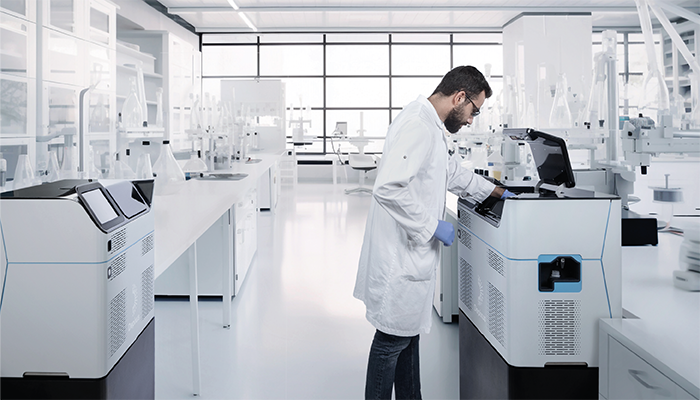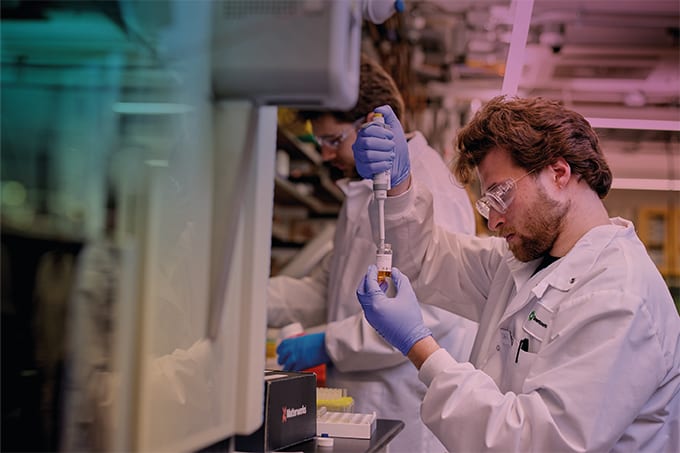
The world’s first commercial technology for exploring single molecule interactomics at scale
Produced by Depixus SAS
The Depixus MAGNA One uses Magnetic Force Spectroscopy (MFS) to measure binding forces, conformational changes, and kinetics at the individual molecule level, scaling to thousands of interactions in parallel. Unlike static or bulk-average techniques, it delivers direct, dynamic data on DNA, RNA, proteins, and small molecules, offering new insights into molecular heterogeneity and rare biological events.
Its accessibility and precision make it a versatile tool for research in biophysics, disease mechanisms, and drug discovery, improving confidence in lead selection and enabling the development of more effective therapeutics.
What the judges say…
“New leap in the measurement of bio-molecular interactions.”
“Potential to provide key information at the molecular level for drug discovery.”
Meet the Expert: Gordon Hamilton

I’m Gordon Hamilton, co-founder and CEO of Depixus. Depixus is a life-science tools company pioneering the commercialisation of magnetic force spectroscopy (MFS) to reveal the intricate world of single molecule interactions. Our flagship instrument, Depixus MAGNA One, brings the power of MFS into the lab for the first time, enabling direct real-time analysis of thousands of individual dynamic biomolecular interactions in parallel.
Existing technologies for studying how molecules interact all have limitations. X-ray crystallography, for example, is technically complex and only generates a static snap-shot. Techniques like surface plasmon resonance (SPR) can generate a more dynamic picture of how molecules interact but rely on surrogate measurements and bulk averages. Other single molecule technologies, such as optical tweezers and atomic force spectroscopy, are unable to scale to the level demanded by modern research pipelines.
Our key innovation is combining the analytical power and precision of MFS with advances in imaging technology. Each individual pixel of a camera can be used to independently track the real-time dynamics of a single molecular interaction occurring directly above it, opening the door to massive scalability.
Drug discovery is becoming increasingly complex, moving towards novel modalities including multispecific antibodies and proteolysis-targeting chimaeras (PROTACs). At the same time, researchers are pursuing more challenging targets, such as RNA structures and protein degradation pathways. We’re also seeing the emergence of a more sophisticated understanding of the realities of biology at the molecular level, where heterogeneity and rare interactions play crucial but often-overlooked roles in health and disease.
We believe that MAGNA One’s ability to see biology in action at the level of individual molecular interactions will transform the field of interactomics in the same way that single cell sequencing has transformed genomics. By delivering scalable single molecule insights across a wide range of applications - including RNA, DNA, proteins, peptides, antibodies and small molecules - it is poised to become a fundamental enabling technology driving the discovery of the next generation of game-changing therapeutics.
We also see a role for Depixus’ MAGNA One in providing a rich novel data source to support AI drug discovery. Current datasets derived from existing bulk or static analytical technologies don’t capture the complexity of biology as it really happens. Incorporating direct, dynamic information about thousands of individual interactions - including rare and heterogeneous binding events - will help AI models to develop more accurate predictions, reduce bias and reveal new approaches for innovative therapies.
Our technology has already proved its worth in a number of fruitful collaborations that have led to high impact publications. For example, we recently teamed up with Jay Schneekloth at the US National Cancer Institute to reveal the role played by different conformational states in the binding of ligands to an RNA target – important information that would not have been possible to generate using other analytical techniques.
As we continue the commercial roll-out of Depixus MAGNA One, I’m excited to get the instrument system into people’s hands and see what they will do with such a powerful and versatile technology. We hope that MAGNA One will play an important role in the discovery and development of new medicines that will change people’s lives.




